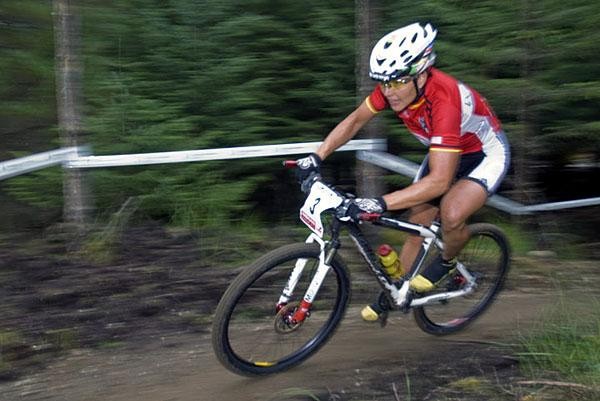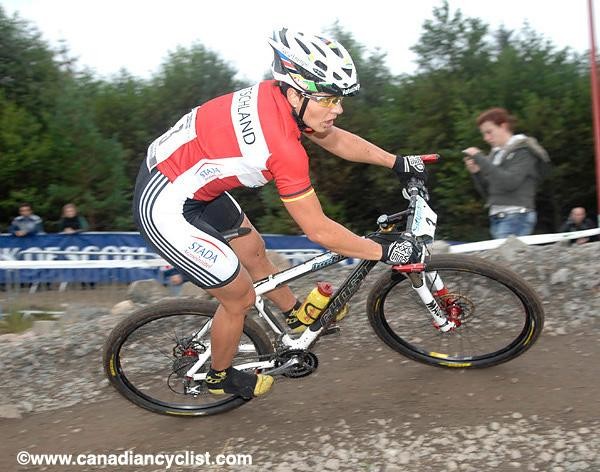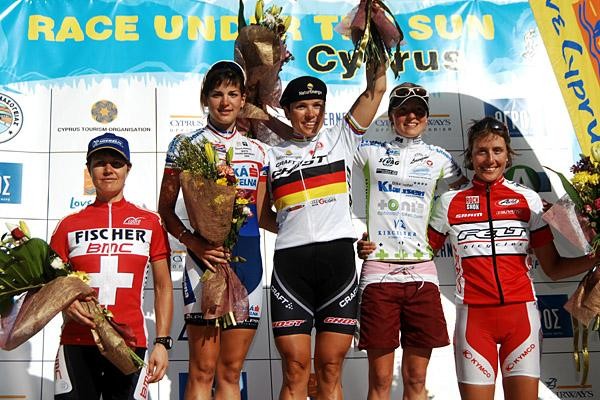The best is yet to come
Sabine Spitz is Germany's top female mountain biker. Winning the German championships from 2001 to...



An interview with Sabine Spitz, October 11, 2007
Sabine Spitz had a great 2007 season, winning two European Champion titles and a silver medal at the World Championships in Scotland. A well-deserved break between seasons was spent ... mountain biking. Spitz was organizing her women's camp in Pontresina, Switzerland, when Cyclingnews' Bjorn Haake talked with her about how she got started in the sport.
Sabine Spitz is Germany's top female mountain biker. Winning the German championships from 2001 to 2006 without interruption showed her domination of the German race scene and in fact, 2007 was the first year she had to settle for silver, behind current time trial road time trial and former cyclo-cross world champion Hanka Kupfernagel. However, overall her 2007 season was very successful. She called 2007 "one of the best years of racing."
It is hard to argue with two European Championships titles, one in cross country, obtained in Turkey in July, and one in the marathon, at the end of the season on home soil in St. Wendel, Germany. Throw in a silver medal at the World Championships in Fort William, Scotland, and it is easy to see why the 35 year-old does not give any thought to retirement. But how did she get where she is today?
Getting started and jumping across the pond
Spitz's career got jump-started in the early 1990s. Her boyfriend (and now husband and manager) Ralf Schäuble was a runner, but had to switch to mountain biking due to an injury. It didn't kill his competitive spirit and so he entered some local races. Spitz didn't want to stay behind and decided to also give mountain bike racing a shot. The rest, as they say, is history.
Spitz's experienced some success right away, but most of the races were, of course, smaller, with few spectators. Then 1995 rolled around and the World Championships were almost in her backyard, in Kirchzarten, Germany. At the time, individuals were able to participate. The German federation still required certain placings, but Spitz was able to satisfy those with some top ten places in national races.
Get The Leadout Newsletter
The latest race content, interviews, features, reviews and expert buying guides, direct to your inbox!
"I got eighth in two races in the Grundig Top Ten races, the predecessor to the Bundesliga races we have now in Germany." Her starting position on the big day wasn't so great, "There were 160 starters and I was in the last row," Spitz laughed. But she managed to pass many competitors to end up in 35th. That day changed her whole outlook on the sport.
"The masses of spectators were incredible – 30,000 people. It was so different than what I was used to from the other races." It made her go out and look for a ... coach. Until then she hadn't trained with any structure. Steadily, she moved up to the top ranks and also started to race more internationally.
"The first time I went to the US, I did the Cactus Cup in Arizona, then Sea Otter [Monterey, California] and the World Cup in Napa. We stayed with a friend in San Francisco for three weeks. A nice city – I can imagine why people want to live there," she recalled her experiences across the pond. Unfortunately, she discovered things weren't always as they seemed. "The weather in California wasn't quite as we had expected. We had a different image in our head. The races were in the spring, and it still can get pretty cold there. One year it was raining like crazy."
But she did enjoy the courses. "The Americans have a different attitude when they put the courses together. The loops are much longer [Sea Otter is around 30km]," Spitz was happy for the change. "It makes it much more interesting for the racers, but is of course less spectator-friendly and it is also not great for the team helpers," she remarked on the difference relative to the shorter courses in Europe. "It seems the Americans market it less. The Euro courses are a bit more media-friendly." One of the reasons in her mind is that it is hard for any sport to surpass American football, basketball and baseball in level of general interest, so maybe there is less effort made to promote mountain bike racing in the first place.
On the Olympics and 'cross racing
Spitz went on to become very successful with a ninth place in the 2000 Olympics in Sydney and a bronze medal at the 2004 Olympics in Athens. She also won the World Cross Country Championships in 2003. For a few years, she added cyclo-cross to her program - even winning a silver medal at the Worlds in 2005. That year, when the race was held in St. Wendel, she made 'cross her main focus for the year. She recalled the build up to the race. "It had been a mild winter. I did the first races in November and we had temperatures of up to 15 degrees centigrade in some races." Then temperatures plummeted right before the Worlds. "It was only around then that we had temperatures below freezing," she said, rating her performance as high considering she does not like cold temperatures as much.
She hasn't planned any cyclo-cross this season. Instead, she wants to repeat the same training regimen as last year, with the Olympics as her main goal. "But in 2008/2009 I can imagine doing cyclo-cross again. It is a fun event. The races are short and dynamic and I like it. It also depends if the sponsor supports it. Previously it was my husband Ralf and I who did the races out of our own initiative, but you really need to have two people in the support crew to do well."
A good year and looking forward
With all the success, there was just one thing missing. Spitz had been chasing the top spot in the European championships. She came close several times. Finally this year, it clicked. In July she won the gold medal in Cappadocia, Turkey, ahead of Irina Kalentieva. With that goal reached, the pressure subsided, and Spitz managed to add another European Championship gold medal, this time in the marathon event. It was held in Germany's mountain bike mecca, St. Wendel. The race was in September, and rain had made the course tough. "They had changed the course compared to previous years and made it more technical," said Spitz, "but because of the botanical and geological characteristics with the trees and the loamy soil, the ground was saturated and the rain water had nowhere to go. It was very slippery and a tough course."
She tried hard to repeat her 2003 win at the mountain bike cross country world championships, but came up short in Fort William, Scotland. Nonetheless, she was happy with her result. "Maybe the old course would have been better, with the many little climbs. Now, there was only one long uphill and one long downhill. I really never had a major international race or championship before where a descent lasted more than seven minutes." At least this time the temperatures weren't as cold as she had seen in Scotland in the past. "It was overcast, but dry. Pretty good conditions on race day."
Spitz is now taking a well-deserved end of season break from racing. It doesn't mean she takes off from mountain biking completely. She was hosting her Ladies Camp, from October 3 to 6. "There are 14 women and they are usually more recreational riders than racers. The goal is to teach them some technical stuff," said Spitz about the camp. Held in Pontresina, in the Engadin in Switzerland, the riding is great. "This is one of my favourite areas, although I really also like the area near my home, in the Black Forest and the northern part of the Jura, in Switzerland.
Why go to places far away when the good stuff is so close?" Spitz smiled, citing a German saying. "The only problem can be the weather. It was raining hard today. We meant to start at 10:00 am, but there was no way, so we rescheduled for noon. The sun came out a little bit, but we still got soaked a couple of times." The German added, "It's not so bad when you are just out riding, but we stopped several times for the technical sessions and when you are wet and stand around, then it's really unpleasant." This camp is a welcome break in her training and coincided perfectly with her break from racing in October.
"The build up is then from November through mid-January. I will be doing other things like athletic training, weight lifting, cross country skiing. That one is good for the upper body and also is just plain fun. My favourite area is also here in the Engadin. They have 180 kilometres of groomed trails for both striding and skating."
Despite her dislike for the cold she can tolerate the weather here. "Yes, it's cold, but the air is pretty dry." Later, she may include road races for interval training. The interval training is done on the road as well as off-road. She also revealed that the training for the marathon really comes as a side benefit. "I need the endurance part for the mountain bike races anyway."
She noted that taking the reverse approach might be harder. "A marathon specialist doesn't necessarily have the intensity needed for the shorter cross country races." Averaged over the year, her weekly training time is about 20 to 25 hours.
She had a hard time picking a singular race that stood out for her over the course of her career. "It is nice when you reach your goal. My first World Cup victory, the World Championships or the bronze medal in Athens – those are all great memories." And at 35 she still feels she hasn't passed her peak just yet. So there'll be time to add more memories.